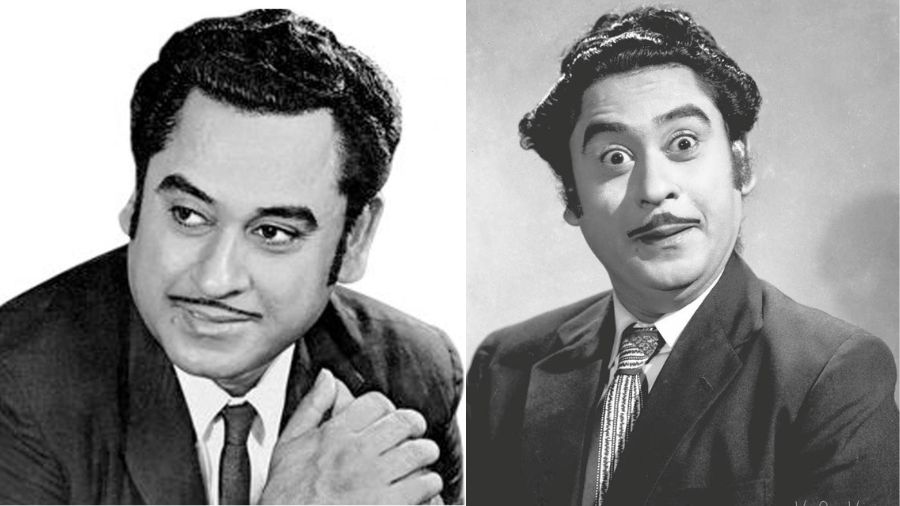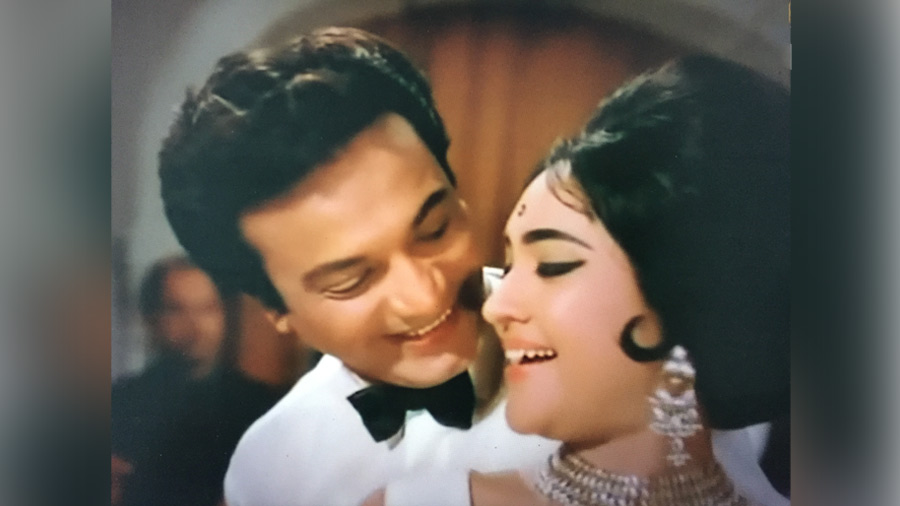Romance, humour, heartbreak — there's a Kishore Kumar song for every occasion and every mood. He was the man who brought yodelling to mainstream Bollywood, and could make us laugh, cry and turn into a pile of mush with his voice alone. In a career that spanned over 40 years, the musical maestro gave us a melody for every mood, and continues to rule our hearts to this day. On his birthday, My Kolkata compiles a short playlist of some of Kishoreda’s most-loved hits across genres, which still make our hearts sing.
When in the mood to groove and dance
Jai Jai Shiv Shankar from Aap Ki Kasam
One of Kishore Kumar’s most jovial numbers, this song made it to the top of every chart in 1974, and continues to be a favourite at every festive gathering, especially Holi. It not only elevated the film’s soundtrack, but is also an iconic souvenir of the singer’s partnership with Rajesh Khanna. A story even says that debutant director J. Om Prakash was furious because the song had cost Rs 50,000 to shoot, and Kishoreda’s final lines, “Bajao re bajao, imandari se bajao, 50 hazar kharcha kar diye”, were supposed to be a mocking way to pacify the director!
Khaike Pan Banaraswala from Don
Don is arguably one of the most diverse albums by Kumar. His voice brought pizazz to Amitabh Bachhan’s suave criminal, while never losing his boyish charm. If there was one thing the singer was known for, apart from his musical and acting chops, it was his quirkiness. The story goes, that for this famous number, Kumar put forth the condition that he would only sing it once, and while chewing a paan during recording. He wanted to capture the sensation of chewing a betel leaf, such was his commitment to authenticity.
Apni toh Jaise Taise from Laawaris
Unlike most party numbers today, including flashy remakes, this one stands out for being relatively simple. Kumar’s flamboyance shines through brilliantly and complements Bachchan’s signature dance moves. The lyrics by Prakash Mehra and Anjaan have immense recall value, and the peppy beats still manage to rejuvenate a party when it plays at 2am!
Heartbreaking Melodies
Mere Naina Sawan Bhadon from Mehbooba
Anand Bakshi’s lyrics, Kishoreda’s voice and the music of this ballad makes it one of the most heartbreaking romantic numbers to grace the silver screen. R.D. Burman — Panchamda — once revealed an interesting story behind this song. Kishore Kumar refused the song when he was first approached, but agreed later on the condition that he would only come on board after Lata Mangeshkar had recorded the female version. Apparently, he listened to Lata’s version for seven days before finally agreeing to record the male version. Even though he claimed to have memorised her version, Panchamda felt that Kishore’s pain came from within, and added his unique magic to the song.
Tere Bina Zindagi Se Koi from Aandhi
Everything about this song is hauntingly beautiful. Kishore and Lata croon about heartbreak and separation as Sanjeev Kumar and Suchitra Sen steal glances against the backdrop of the ancient Martand Sun Temple. One of those few Bollywood songs that speak of love, romance and heartbreak and feature an older couple, Kishore brought out all the complicated yet familiar emotions of the song with seeming ease. The lyrics, which fetched Gulzar a Filmfare nomination, were written around the tune of the popular Bengali song sung by Panchamda, Jete Jete Pothe Holo Deri, but took on a life of its own.
Kuch to Log Kahenge from Amar Prem
A lesson learnt and given at the same time, the very mention of this Anand Bakshi classic evokes the image of a broken Sharmila Tagore with a sombre Rajesh Khanna. Every single word hits home, reminding us that society will talk, but we need to live for ourselves. Lyrics that are used even today to pacify, to console and to tell people to forget the world. “Kuch reet jagat ki aisi hai har ek subah ki shaam hui, Tu kaun hai tera naam hai kya Sita bhi yahaan badnaam hui.”
Laughs and love
Mere Samne Wali Khidki Mein from Padosan
That really popular person from the para, the dream girl who lives next door. The emotions that this song talks about are universal, and many of us have hummed these lines under our breath. This song (along with almost every other song in this movie) is testament to Kishore Kumar’s unique brand of humour, which seeped into his singing as well. In the scene, lead actor Sunil Dutt is lip-syncing to his theatre enthusiast friend, Kishore Kumar, while trying to woo Saira Banu, with what she believes is Dutt’s singing. The subtle laughs, the little variations in voice, and the perfect score manifests brilliantly on screen.
Roop Tera Mastana from Aradhana
It is near impossible to pick one song from an album that comprises much-loved numbers like the Darjeeling toy train travel anthem Mere Sapno Ki Rani and the ultimate sweet, flirty number, Kora Kagaz Tha Yeh Man Mera. Yet, there is a certain charm to this particular number where Kishore Kumar gives us so many moods of romance — flirtation, cheekiness, shyness and sexual tension. Amit Kumar once said that before this song became his father’s big comeback, it was supposed to be quite different. However, Kishore brought his own touch from one of his Bengali numbers turning it into what it is now. And he recorded it in one take!
Yeh Shaam Mastani from Kati Patang
The introductory whistle of this song is synonymous with Kishore’s genius. The Hindi version came after a non-filmy Bengali version, sung by Kishore Kumar himself. The free-spirited nature of the Bengali number, and Kishore’s carefree vocals translate to the Hindi version as well, which has a romantic note to it. The music director is said to have made many changes to Anand Bakshi’s lyrics too. This song is one of the most enduring images of Kumar’s partnership with Rajesh Khanna.

